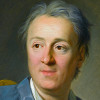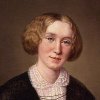“ If a man could not love and be wise, surely he could flirt and be wise at the same time? ”
George Eliot, Middlemarch (1872). copy citation
| Author | George Eliot |
|---|---|
| Source | Middlemarch |
| Topic | love flirting |
| Date | 1872 |
| Language | English |
| Reference | |
| Note | |
| Weblink | http://www.gutenberg.org/files/145/145-h/145-h.htm |
Context
“Lydgate found it more and more agreeable to be with her, and there was no constraint now, there was a delightful interchange of influence in their eyes, and what they said had that superfluity of meaning for them, which is observable with some sense of flatness by a third person; still they had no interviews or asides from which a third person need have been excluded. In fact, they flirted; and Lydgate was secure in the belief that they did nothing else. If a man could not love and be wise, surely he could flirt and be wise at the same time? Really, the men in Middlemarch, except Mr. Farebrother, were great bores, and Lydgate did not care about commercial politics or cards: what was he to do for relaxation? He was often invited to the Bulstrodes’;”
source



